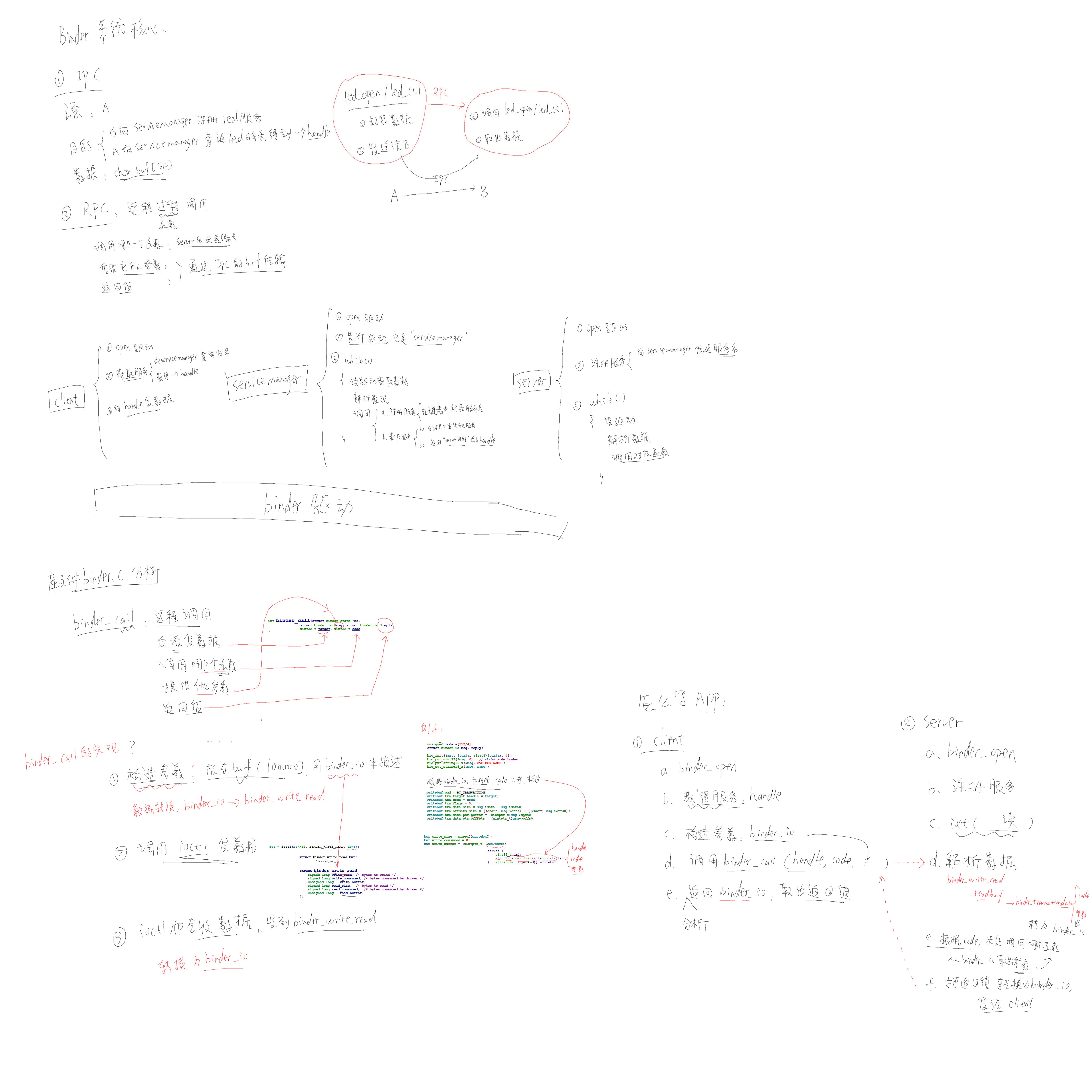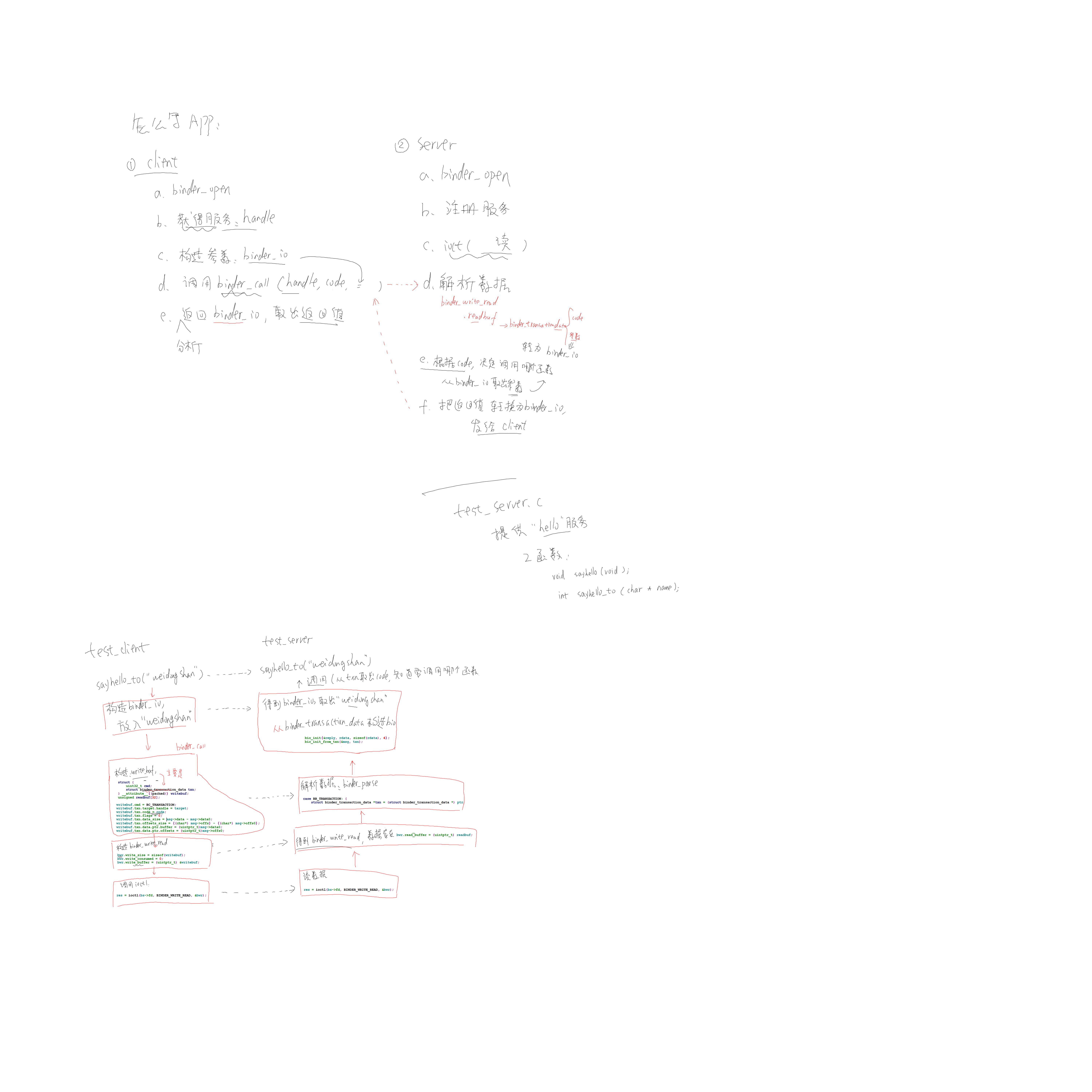Android Binder机制为client-server的通讯实现两个进程之间的通讯,就是一个客户端一个服务端。
Server端:
| /* Copyright 2008 The Android Open Source Project */ #include <stdio.h> #include <stdlib.h> #include <errno.h> #include <linux/types.h> #include<stdbool.h> #include <string.h> #include <private/android_filesystem_config.h> #include "binder.h" #include "test_server.h" int svcmgr_publish(struct binder_state *bs, uint32_t target, const char *name, void *ptr) { int status; unsigned iodata[512/4]; struct binder_io msg, reply; bio_init(&msg, iodata, sizeof(iodata), 4); bio_put_uint32(&msg, 0); // strict mode header bio_put_string16_x(&msg, SVC_MGR_NAME); bio_put_string16_x(&msg, name); bio_put_obj(&msg, ptr); if (binder_call(bs, &msg, &reply, target, SVC_MGR_ADD_SERVICE)) return -1; status = bio_get_uint32(&reply); binder_done(bs, &msg, &reply); return status; } void sayhello(void) {static int cnt = 0; fprintf(stderr, "say hello : %d\n", ++cnt); } /* 当Client调用sayhello_to("hello");的时候,会Server这里binder_loop(bs, test_server_handler); 得到了一个binder_io,触发hello_service_handler(),并取出这里Client传过去的值,还有Code 在hello_service_handler()里根据Code来最后调用到这里的sayhello_to("hello"); */ int sayhello_to(char *name) { static int cnt = 0; fprintf(stderr, "say hello to %s : %d\n", name, ++cnt); return cnt; } void saygoodbye(void) { static int cnt = 0; fprintf(stderr, "say goodbye : %d\n", ++cnt); } int saygoodbye_to(char *name) { static int cnt = 0; fprintf(stderr, "say goodbye to %s : %d\n", name, ++cnt); return cnt; } /* 当Client调用sayhello_to("hello");的时候,会Server这里binder_loop(bs, test_server_handler); 得到了一个binder_io,触发hello_service_handler(),并取出这里Client传过去的值,还有Code 在hello_service_handler()里根据Code来最后调用到这里的相应函数 */ int hello_service_handler(struct binder_state *bs,struct binder_transaction_data *txn, struct binder_io *msg, struct binder_io *reply) { /* 根据txn->code知道要调用哪一个函数 * 如果需要参数, 可以从msg取出 * 如果要返回结果, 可以把结果放入reply */ /* sayhello * sayhello_to */ uint16_t *s; char name[512]; size_t len; uint32_t handle; uint32_t strict_policy; int i; // Equivalent to Parcel::enforceInterface(), reading the RPC // header with the strict mode policy mask and the interface name. // Note that we ignore the strict_policy and don't propagate it // further (since we do no outbound RPCs anyway). strict_policy = bio_get_uint32(msg); switch(txn->code) { case HELLO_SVR_CMD_SAYHELLO: sayhello(); bio_put_uint32(reply, 0); /* no exception */ return 0; case HELLO_SVR_CMD_SAYHELLO_TO: /* 从msg里取出字符串 */ s = bio_get_string16(msg, &len); //"IHelloService" s = bio_get_string16(msg, &len); // name if (s == NULL) { return -1; } for (i = 0; i < len; i++) name[i] = s[i]; name[i] = '\0'; /* 处理 */ i = sayhello_to(name); /* 把结果放入reply */ bio_put_uint32(reply, 0); /* no exception */ bio_put_uint32(reply, i); break; default: fprintf(stderr, "unknown code %d\n", txn->code); return -1; } return 0; } int goodbye_service_handler(struct binder_state *bs, struct binder_transaction_data *txn, struct binder_io *msg, struct binder_io *reply) { /* 根据txn->code知道要调用哪一个函数 * 如果需要参数, 可以从msg取出 * 如果要返回结果, 可以把结果放入reply */ /* sayhello * sayhello_to */ uint16_t *s; char name[512];size_t len; uint32_t handle; uint32_t strict_policy; int i; // Equivalent to Parcel::enforceInterface(), reading the RPC// header with the strict mode policy mask and the interface name. // Note that we ignore the strict_policy and don't propagate it // further (since we do no outbound RPCs anyway). strict_policy = bio_get_uint32(msg); switch(txn->code) {case GOODBYE_SVR_CMD_SAYGOODBYE: saygoodbye(); bio_put_uint32(reply, 0); /* no exception */ return 0; case GOODBYE_SVR_CMD_SAYGOODBYE_TO: /* 从msg里取出字符串 */ s = bio_get_string16(msg, &len); //"IGoodbyeService" s = bio_get_string16(msg, &len); // name if (s == NULL) { return -1; } for (i = 0; i < len; i++) name[i] = s[i]; name[i] = '\0'; /* 处理 */ i = saygoodbye_to(name); /* 把结果放入reply */ bio_put_uint32(reply, 0); /* no exception */ bio_put_uint32(reply, i); break; default: fprintf(stderr, "unknown code %d\n", txn->code); return -1; } return 0; } int test_server_handler(struct binder_state *bs, struct binder_transaction_data *txn, struct binder_io *msg, struct binder_io *reply) { int (*handler)(struct binder_state *bs, struct binder_transaction_data *txn, struct binder_io *msg, struct binder_io *reply); //函数指针 handler = (int (*)(struct binder_state *bs, struct binder_transaction_data *txn, struct binder_io *msg, struct binder_io *reply))txn->target.ptr; //从这个函数的参数里得到txn->target.ptr,然后强制转为一个函数指针 return handler(bs, txn, msg, reply); //从这个函数的参数里得到txn->target.ptr函数指针,调用 一下 } int main(int argc, char **argv) { int fd; struct binder_state *bs; //binder_state 是一个binder设备文件的状态 /* binder_state定义: struct binder_state { int fd; //打开的文件描述符 void *mapped; //通过mmap把"/dev/binder"设备文件映射到进程虚拟空间的地址(用户空间) unsigned mapsize; }; */ uint32_t svcmgr = BINDER_SERVICE_MANAGER;uint32_t handle; int ret; bs = binder_open(128*1024); //初始化binder,打开/dev/binder设备;在内存中为binder映射128K字节空间 if (!bs) { fprintf(stderr, "failed to open binder driver\n"); return -1; } /* add service */ ret = svcmgr_publish(bs, svcmgr, "hello", hello_service_handler); //添加服务(注册服务) if (ret) { fprintf(stderr, "failed to publish hello service\n"); return -1; } ret = svcmgr_publish(bs, svcmgr, "goodbye", goodbye_service_handler); //添加服务(注册服务) if (ret) { fprintf(stderr, "failed to publish goodbye service\n"); } #if 0 while (1) { /* read data */ /* parse data, and process */ /* reply */ } #endif binder_set_maxthreads(bs, 10); //binder设置最大的进程个数 /* Client调用sayhello_to(),会构造binder_io() Client调用binder_call,会得到一个struct writebuf保存数据,这里相反,是调用binder_loop后得到readbuf 读取数据 Client struct writebuf这个结构体里主要得到一个struct binder_transaction来构造数据,这里Server是得到struct binder_transaction来解析数据 Client再构造一个binder_write_read结构体,这里相反,是调用binder_loop后得到binder_write_read结构体 Client最后通过ioctl();函数把数据发出去。 然后Server调用binder_loop后也是通过ioctl();函数来得到数据的。 最终,这里Server通过binder_transaction会还原出一个binder_io,最后调用到Server里的sayhello_to() 这里最后进入 test_server_handler函数里 */ binder_loop(bs, test_server_handler); //循环的读取 数据,解析数据,返回数据return 0; } |
Client:
| /* Copyright 2008 The Android Open Source Project */ #include <stdio.h> #include <stdlib.h> #include <errno.h> #include <linux/types.h> #include<stdbool.h> #include <string.h> #include <private/android_filesystem_config.h> #include "binder.h" #include "test_server.h" uint32_t svcmgr_lookup(struct binder_state *bs, uint32_t target, const char *name) { uint32_t handle; unsigned iodata[512/4]; struct binder_io msg, reply; bio_init(&msg, iodata, sizeof(iodata), 4); bio_put_uint32(&msg, 0); // strict mode header bio_put_string16_x(&msg, SVC_MGR_NAME); bio_put_string16_x(&msg, name); if (binder_call(bs, &msg, &reply, target, SVC_MGR_CHECK_SERVICE)) return 0; handle = bio_get_ref(&reply); if (handle) binder_acquire(bs, handle); binder_done(bs, &msg, &reply); return handle; } struct binder_state *g_bs; uint32_t g_hello_handle; uint32_t g_goodbye_handle; void sayhello(void) { unsigned iodata[512/4]; struct binder_io msg, reply; /* 构造binder_io */ bio_init(&msg, iodata, sizeof(iodata), 4); bio_put_uint32(&msg, 0); // strict mode header bio_put_string16_x(&msg, "IHelloService"); /* 放入参数 */ /* 调用binder_call */ if (binder_call(g_bs, &msg, &reply, g_hello_handle, HELLO_SVR_CMD_SAYHELLO)) return ; /* 从reply中解析出返回值 */ binder_done(g_bs, &msg, &reply); } int sayhello_to(char *name) { unsigned iodata[512/4]; struct binder_io msg, reply; int ret; int exception; /* 构造binder_io */ bio_init(&msg, iodata, sizeof(iodata), 4); bio_put_uint32(&msg, 0); // strict mode header bio_put_string16_x(&msg, "IHelloService"); /* 放入参数(data) ,这时候在Server那里会得到了一个binder_io,并取出这里Client传过去的值 */ bio_put_string16_x(&msg, name); /* 调用binder_call,会得到一个struct writebuf, 这个结构体里主要得到一个struct binder_transaction来构造数据 再构造一个binder_write_read结构体 最后通过ioctl();函数把数据发出去。 然后Server也是通过ioctl();函数来得到数据的。 */ if (binder_call(g_bs, &msg, &reply, g_hello_handle, HELLO_SVR_CMD_SAYHELLO_TO))return 0; /* 从reply中解析出返回值 */ exception = bio_get_uint32(&reply); if (exception) ret = -1; else ret = bio_get_uint32(&reply); binder_done(g_bs, &msg, &reply); return ret; } void saygoodbye(void) { unsigned iodata[512/4]; struct binder_io msg, reply; /* 构造binder_io */ bio_init(&msg, iodata, sizeof(iodata), 4); bio_put_uint32(&msg, 0); // strict mode header bio_put_string16_x(&msg, "IGoodbyeService"); /* 放入参数 */ /* 调用binder_call */ if (binder_call(g_bs, &msg, &reply, g_goodbye_handle, GOODBYE_SVR_CMD_SAYGOODBYE)) return ; /* 从reply中解析出返回值 */ binder_done(g_bs, &msg, &reply); } int saygoodbye_to(char *name) { unsigned iodata[512/4]; struct binder_io msg, reply; int ret; int exception; /* 构造binder_io */ bio_init(&msg, iodata, sizeof(iodata), 4); bio_put_uint32(&msg, 0); // strict mode header bio_put_string16_x(&msg, "IGoodbyeService"); /* 放入参数 */ bio_put_string16_x(&msg, name); /* 调用binder_call */ if (binder_call(g_bs, &msg, &reply, g_goodbye_handle, GOODBYE_SVR_CMD_SAYGOODBYE_TO)) return 0; /* 从reply中解析出返回值 */ exception = bio_get_uint32(&reply); if (exception) ret = -1; else ret = bio_get_uint32(&reply); binder_done(g_bs, &msg, &reply); return ret; } /* ./test_client hello * ./test_client hello <name> */ int main(int argc, char **argv) { int fd; struct binder_state *bs; uint32_t svcmgr = BINDER_SERVICE_MANAGER; uint32_t handle; int ret; if (argc < 2){ fprintf(stderr, "Usage:\n"); fprintf(stderr, "%s <hello|goodbye>\n", argv[0]); fprintf(stderr, "%s <hello|goodbye> <name>\n", argv[0]); return -1; } bs = binder_open(128*1024); if (!bs) { fprintf(stderr, "failed to open binder driver\n"); return -1; } g_bs = bs; /* get service */ handle = svcmgr_lookup(bs, svcmgr, "goodbye"); if (!handle) { fprintf(stderr, "failed to get goodbye service\n"); return -1; } g_goodbye_handle = handle; fprintf(stderr, "Handle for goodbye service = %d\n", g_goodbye_handle); handle = svcmgr_lookup(bs, svcmgr, "hello"); if (!handle) { fprintf(stderr, "failed to get hello service\n"); return -1; } g_hello_handle = handle; fprintf(stderr, "Handle for hello service = %d\n", g_hello_handle); /* send data to server */ if (!strcmp(argv[1], "hello")) { if (argc == 2) { sayhello(); } else if (argc == 3) { ret = sayhello_to(argv[2]); //这里调用的时候,会构造一个binder_io,放入argv[2]用户输入的字符串 fprintf(stderr, "get ret of sayhello_to = %d\n", ret); } } else if (!strcmp(argv[1], "goodbye")) { if (argc == 2) { saygoodbye(); } else if (argc == 3) { ret = saygoodbye_to(argv[2]); fprintf(stderr, "get ret of sayhello_to = %d\n", ret); } } binder_release(bs, handle); return 0; } |






















 3808
3808











 被折叠的 条评论
为什么被折叠?
被折叠的 条评论
为什么被折叠?








